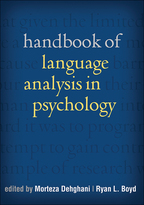Handbook of Language Analysis in Psychology
Edited by Morteza Dehghani and Ryan L. Boyd
Hardcovere-bookprint + e-book
Hardcover
orderMarch 2, 2022
ISBN 9781462548439
Price: $103.00 630 Pages
Size: 7" x 10"
“Highly recommended. Graduate students, faculty, and professionals.”

—Choice Reviews
“Language provides a richer, more detailed window into the human experience than any other source of data, and large-scale computational techniques have created unprecedented opportunities in the study of human psychology. This volume provides a comprehensive examination of language analysis methods and how they are being used across an astonishing range of psychological research. It will be highly valuable to students and scholars in psychology who are seeking a relevant, up-to-date overview of text analysis methods. Conversely, this book also represents an invitation to computational folks to better understand the nature of psychological research questions and the ways that their text analysis expertise can help advance understanding of what makes people tick.”

—Philip Resnik, PhD, Department of Linguistics and Institute for Advanced Computer Studies, University of Maryland, College Park
“The accelerating growth of new computational methods, theories, and applications in language analysis opens up exciting possibilities for researchers, but it can also be daunting if you are entering the field or trying to keep up to speed. But never fear! Dehghani and Boyd have brought together a formidable crew of experts to create an accessible guide to the latest developments in language analysis. This book is an ideal text for a graduate course, and can serve as a reference and source of inspiration for researchers.”

—Sanjay Srivastava, PhD, Department of Psychology, University of Oregon
“This handbook assembles many of the best researchers who quantitatively analyze language to better understand people. The coverage is impressively broad, from personality to politics, from conversations and deception to the language of affect and morality. The methods used are equally broad, from the use of classical lexica to modern vector embedding methods. This book is ideal for a graduate seminar in psychology or related fields on the ways in which language analysis is yielding insights into human thought, behavior, and communication.”

—Lyle Ungar, PhD, Department of Computer and Information Science, University of Pennsylvania
—Choice Reviews
“Language provides a richer, more detailed window into the human experience than any other source of data, and large-scale computational techniques have created unprecedented opportunities in the study of human psychology. This volume provides a comprehensive examination of language analysis methods and how they are being used across an astonishing range of psychological research. It will be highly valuable to students and scholars in psychology who are seeking a relevant, up-to-date overview of text analysis methods. Conversely, this book also represents an invitation to computational folks to better understand the nature of psychological research questions and the ways that their text analysis expertise can help advance understanding of what makes people tick.”
—Philip Resnik, PhD, Department of Linguistics and Institute for Advanced Computer Studies, University of Maryland, College Park
“The accelerating growth of new computational methods, theories, and applications in language analysis opens up exciting possibilities for researchers, but it can also be daunting if you are entering the field or trying to keep up to speed. But never fear! Dehghani and Boyd have brought together a formidable crew of experts to create an accessible guide to the latest developments in language analysis. This book is an ideal text for a graduate course, and can serve as a reference and source of inspiration for researchers.”
—Sanjay Srivastava, PhD, Department of Psychology, University of Oregon
“This handbook assembles many of the best researchers who quantitatively analyze language to better understand people. The coverage is impressively broad, from personality to politics, from conversations and deception to the language of affect and morality. The methods used are equally broad, from the use of classical lexica to modern vector embedding methods. This book is ideal for a graduate seminar in psychology or related fields on the ways in which language analysis is yielding insights into human thought, behavior, and communication.”
—Lyle Ungar, PhD, Department of Computer and Information Science, University of Pennsylvania



